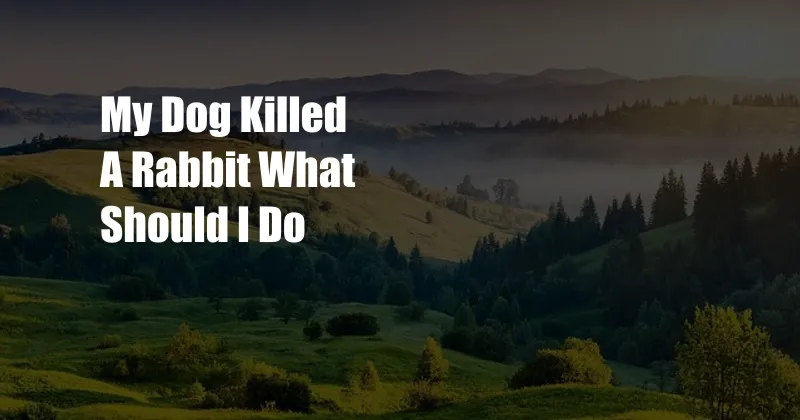
***My Dog Killed a Rabbit: What Should I Do?***
A walk in the park with your beloved canine companion can turn into a horrifying experience when you witness them attacking a small creature. Such was the case for me, when my dog, Max, pounced on a helpless rabbit. The sight of the lifeless animal filled me with a mix of guilt and concern.
If your dog has killed a rabbit, you may be wondering what to do next. This article will provide a comprehensive guide on how to handle this situation, including immediate steps, safety precautions, health considerations, proper disposal, and emotional support.
***Understanding Your Dog’s Behavior***
Dogs have a natural predatory instinct, and chasing small animals is a part of their genetic makeup. While it can be distressing to witness, it’s important to remember that your dog is not necessarily being malicious.
However, it’s crucial to address this behavior to prevent future incidents. If your dog has a history of chasing or killing small animals, it’s advisable to consult with a veterinarian or a certified dog behaviorist to determine the underlying cause and develop a training plan.
***Immediate Steps***
If your dog has killed a rabbit, the first step is to ensure the safety of both your dog and the rabbit’s remains:
- Leash your dog immediately to prevent further attacks.
- Gently remove the rabbit from your dog’s mouth if it is still holding it.
- Dispose of the rabbit’s remains responsibly (see section below).
***Health Considerations***
Rabbits can carry diseases that can be transmitted to dogs and humans. It’s important to take the following precautions:
- Wear gloves when handling the rabbit’s remains.
- Wash your hands thoroughly with soap and water after handling the remains.
- Observe your dog for any signs of illness, such as vomiting, diarrhea, or lethargy.
- Consult with your veterinarian if you have any concerns about your dog’s health.
***Responsible Disposal***
It is crucial to dispose of the rabbit’s remains responsibly to avoid attracting other animals and potential health risks. Here are some options:
- Bury the remains in a deep hole in your yard and cover them with at least 6 inches of soil.
- Wrap the remains in a plastic bag and dispose of them in an outdoor garbage bin with a tight-fitting lid.
- Contact your local animal control or veterinary clinic for disposal options.
***Emotional Support***
Witnessing your dog kill a rabbit can be emotionally distressing for both you and your dog. Here are some tips for coping:
- Seek support from friends, family, or a therapist if you are feeling overwhelmed.
- Be patient with your dog. They may be feeling scared or confused after the incident.
- Offer your dog extra affection and reassurance.
- Consider consulting with a dog behaviorist if you are having difficulty coping with your dog’s behavior.
***FAQs***
Q: Should I punish my dog for killing a rabbit?
A: No. Punishing your dog will only make them fearful and may damage your relationship with them. It’s more effective to focus on training and preventing future incidents.
Q: Can my dog get sick from killing a rabbit?
A: Yes. Rabbits can carry diseases that can be transmitted to dogs. It’s important to observe your dog for any signs of illness and consult with your veterinarian if you have any concerns.
Q: How can I prevent my dog from killing rabbits in the future?
A: There are several steps you can take, including training your dog to obey commands, keeping them on a leash, and providing them with plenty of exercise to reduce their predatory instincts.
***Conclusion***
If your dog has killed a rabbit, it’s important to handle the situation calmly and responsibly. By following the steps outlined in this guide, you can protect your dog and yourself, prevent future incidents, and ensure the proper disposal of the animal’s remains. Remember, your dog’s behavior is not necessarily malicious, and with patience and training, you can help them overcome their predatory instincts.
Would you like to learn more about how to manage your dog’s behavior around small animals? If so, I encourage you to explore our website for additional resources and expert advice.